41 things we learned about travel in 2017, from the secret handrail on a plane to the best view in Tuscany
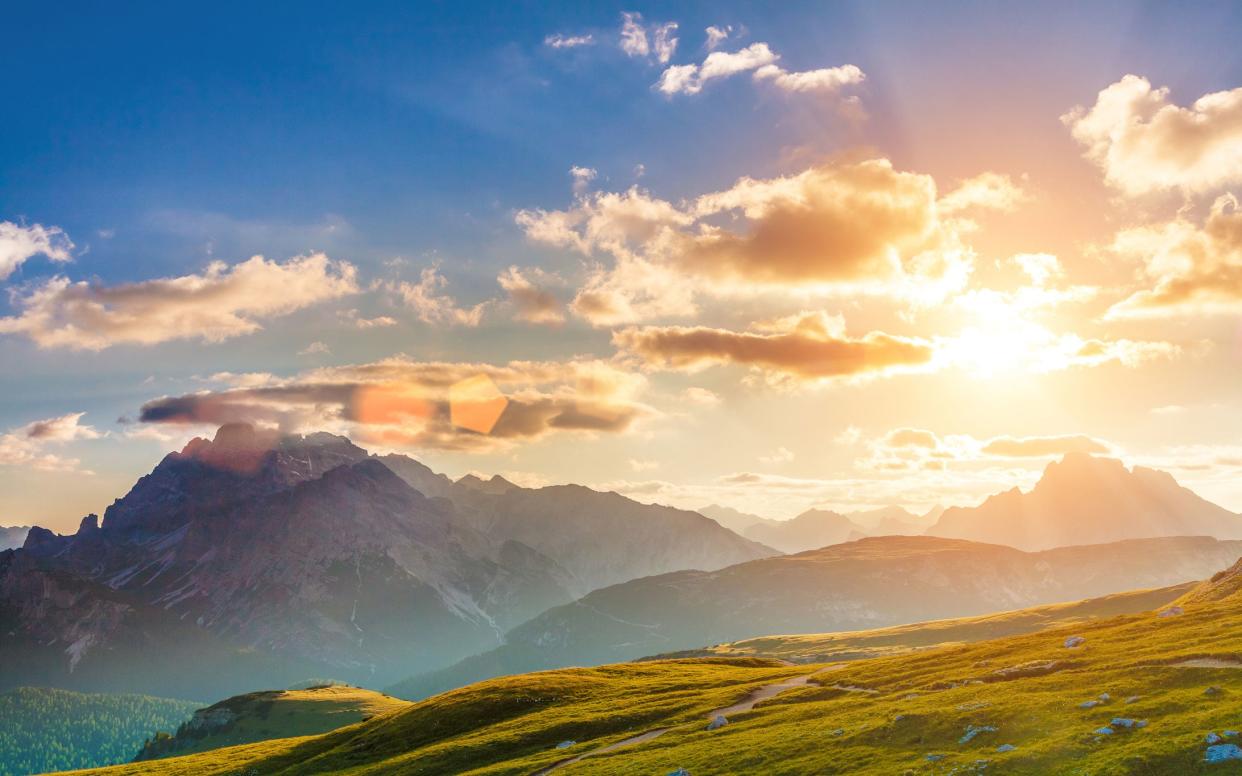
Telegraph Travel grew older and wiser in 2017. Here are a few of the lessons we learned.
1. When hunting the Northern Lights, never say never
After being told there was a “zero per cent chance” she would see the aurora borealis on a recent trip to Finnish Lapland, our own Annabel Fenwick Elliott was understandably disheartened. On her final night, ever the optimist, she asked her guide: “Any chance of a sighting this evening?”, to which he replied: “Impossible.” And then, out of nowhere a spectacular light show began. “Never plan (or cancel) a Northern Lights adventure based on the forecast,” said Annabel.
2. Window seats are more popular than aisle
But only marginally - and men are apparently more likely than women to prefer the aisle. Behavioural psychologist Jo Hemmings explains why people might choose one over the other. “Champions of the window seat tend to be more selfish,” she says. “As well as less anxious, seasoned flyers who are more confident in disturbing others. Aisle passengers are often more sociable and definitely more amenable as people. They are also more likely to be restless flyers and less adept at sleeping on planes.”
3. It’s possible to open a world-class museum in the desert
But it will cost a billion pounds. We’re talking about Abu Dhabi, which just opened a branch of the Louvre on its scorching shores.
4. There’s a secret handrail in aircraft
It’s true. We found it. So now you don’t have to grab peoples’ headrests as you walk down the aisle.
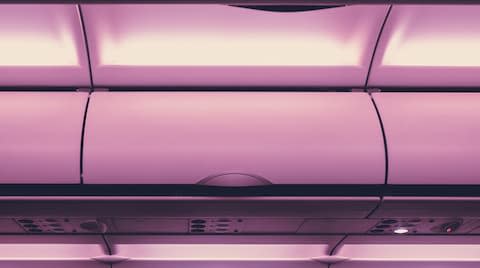
5. Cycling up Mallorcan mountains during a heatwave is a very bad idea
So found Telegraph Travel’s Oliver Smith in October - but hiking up one was a dream. “The biggest of the Balearics has grown up in recent years, ditching the raucous reputation forged in its southern resorts, though most visitors still come here for sun and sea,” he said. “Look inland, however, and there are ancient footpaths to tackle, lofty views to admire, and award-winning wineries in which to sample the fruits of the land.”
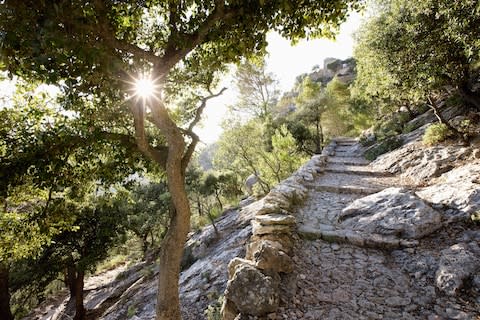
6. You can have an (exhausting) day trip in New York
Thanks to some clever timing from the folks at Norwegian you can arrive in the Big Apple in time for breakfast, blast through a day of cosmopolitan sightseeing and catch the red-eye home. Easy.
7. Going on holiday on your own is divine
So found our family travel editor Sally Peck, who forgot her brief for a week in favour of some me time. Apparently such trips are growing in popularity as they allow people to reflect and rejuvenate.
8. The world’s ‘most useless’ airport is finally being used
St Helena’s £285m airport, dubbed the “world’s most useless” after a series of setbacks, finally welcomed its first scheduled service in October - 12 years after the British government first announced plans to build it.
Emma Thomson was one of the first to fly in. “Isolation has crafted the island’s charm,” she wrote after her visit. “The hurricane news cycles we’re exposed to daily don’t swirl here. Nothing is rushed. Clothes ordered online can take months to arrive and mobile phone coverage wasn’t rolled out until September 2015. Everyone I passed in my rented Ford Focus would wave from behind their steering wheels. Slowly a cloak of calm unclenched my shoulders. Instead of hurtling along the winding lanes between appointments, I would pootle. Fifth gear doesn’t get much action on St Helena.”

9 Rome’s grandest hotel is back
And it is injecting a little bit of La Dolce Vita back into the Italian capital. Nick Trend visited Hotel Eden in April.
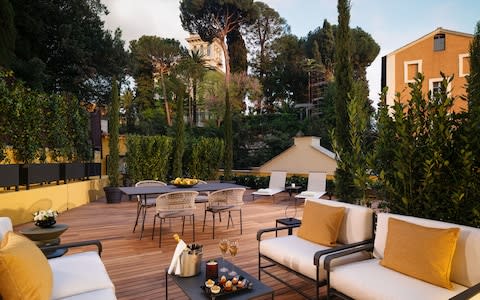
10. Slovenia is blooming beautiful
Think of a cross between the best of the verdant rolling fields of the British countryside and the most charming vibrancy of the Alps. The best way to experience it is to head to the Triglav National Park, not far from the picturesque town of Bled. There you’ll find Mount Triglav, the nation’s tallest peak and source of huge amounts of pride for Slovenians who consider it the duty of every native to reach its summit once in their lifetime. According to Hugh Morris, it should be on everyone’s travel wishlist.
11. Valencia really does have oranges everywhere
It’s all rather pleasant.
12. And very lovely tiles
And a striking space-age museum park.
13. Snow > Father Christmas
Parents take British children to Lapland thinking they should exploit the once-in-a-lifetime chance to visit Father Christmas at his home. But the real magic of Finnish Lapland is far more basic: it’s the snow. To a child on our trip in November, says Sally Peck, the sledging and Huskies get much higher marks than five minutes with the bearded man. Of course, he adds to the atmosphere, but nothing beats making fresh tracks in a real-life Narnia.
14. Planes fly an awful long way in a week
A long-haul flight for the average passenger can feel exhausting - 12 hours in the air is a long time. But that slog pales in comparison when considering the workload of an average commercial aircraft over seven days. We crunched some numbers and discovered, for example, that a British Airways 747 completes 12 flights and 45,000 miles in a week, taking in seven destinations. See here for how many trips a Ryanair jet makes (it’s much, much more).
A week in the life of a BA passenger plane
15. Port is dangerously drinkable, especially with your mum
When Hugh Morris took his mum to Porto, he didn’t anticipate having quite so much fun in the tasting rooms of Graham’s. But then there’s something to be said for enjoying a product in the city of its origin - Guinness in Dublin, champagne in Champagne and port in Porto. And port, as Churchill knew (he drank a bottle a day), goes down far too easily.
16. Why tackle one of the France’s greatest cycling climbs once...
...when you can do it twice? That’s the view of Oliver Smith who enjoyed ascending the 2,115m summit of the Tourmalet in pleasant 20C sunshine so much that he rode down to the bottom to do it again.
17. It’s not easy being an airline
Between the fall from grace of BA in the Telegraph Travel Awards (from top to 13th in the short-haul category) to the collapse of Monarch, carriers have had a tough year. And then there’s Ryanair, whose exponential growth finally hit a bump when the airline “messed up” its pilots’ holiday rosters, leading to the cancellation of hundreds of thousands of bookings.
18. Inverness gets more tourists than Bath
That’s according to VisitBritain, which has the Scottish settlement ahead of the famed Roman city in terms of overnight visitors for 2016. London took top spot, with 19.1m, followed by Edinburgh, with 1.7m, but what was in third place? Find out here.
19. Tunisia’s colosseum is better than Rome’s
The North African country saw its Foreign Office travel restrictions lifted in the summer, allowing our very own Chris Leadbeater to visit in November. “El Djem lies 45 miles south of Sousse, a town which bloomed in the Roman period – not least between 228 and 238 AD, when skilled hands crafted an amphitheatre whose magnificence sings through the ages,” he wrote. “It is visible even as you approach the outskirts, rearing above the plain, an arena of honeyed limestone that held up to 35,000 spectators. To cross its threshold is to tumble into the third century.”
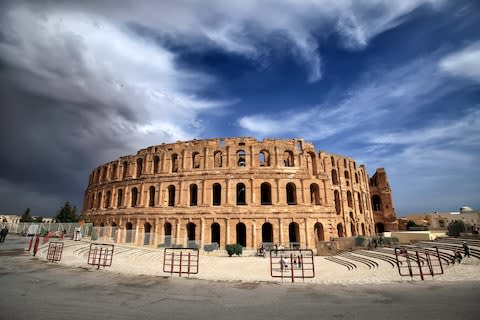
20. We found the best view in Tuscany
It’s from an outdoor table at Terrazza Val D’Orcia in Pienza, not too far from the path to Agriturismo a Terrapille, walked by Russell Crowe in the 2000 film Gladiator.
21. Airport security keeps evolving
In March the Government introduced restrictions on travelling with electronic devices to a number of countries in the Middle East and North Africa. The move followed in the footsteps of the US, where officials revealed “evaluated intelligence” showed that terrorists are “aggressively pursuing innovative measures” to carry out attacks with devices such as laptop bombs.
22. Telegraph readers are fascinated by planes
Many of our most read travel news stories this year related to aviation, from the plane that nearly ran out of fuel after flying for 90 minutes with its landing gear down to the near-miss between an A330 and an A380, the world’s largest passenger jet. But most read of all was AirlineRatings.com’s survey of the world’s safest airlines. Hats off to Qantas.
Top 10 | Most read Telegraph Travel news stories of 2017
23. There’s science behind why we cry on planes
See here for the excuses necessary when you blub at a rubbish rom-com at 35,000 feet.
24. The world loved the Azure Window
The outpouring of grief that followed the collapse of the famous Maltese rock arch into the Mediterranean sea in March was not one normally reserved for a big rock. Fortunately, the remaining rubble on the sea bed has since been pleasing divers - creating a whole new tourism attraction for Gozo.
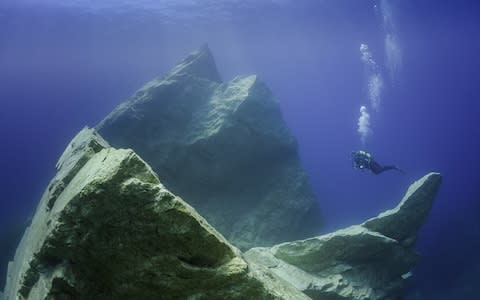
25. The UK has luxury on its doorstep
Family editor Sally Peck reveals where. She says: “In the space of a weekend in a self-catering cottage on the Jurrasic Coast, three generations are able to relax, rejuvenate - and find fossils.”
26. One of the best hotels in Paris was reborn
The H?tel de Crillon, familiar to Marie Antoinette and the World Cup-winning French football team of 1998, is back with a vengeance in the City of Love after a four-year restoration. Nick Trend reckons it is poised to steal the limelight in a city offering more and more luxury accommodation.

27. Italian restaurants hide prices from women
At restaurants in Florence, Taormina and Venice, Oliver Smith found prices removed from the menus of female diners. He adds: “The policy, clearly still prevalent at the country’s poshest restaurants, is like something from the 1950s, if not medieval times. Did the feminist movement never reach Italy?”
28. The Russian Revolution started in a small dining room
2017 marked a hundred years since the event that changed the course of history. Nick Trend headed to St Petersburg to mark the centenary in the city where it all began. He wrote: “In the White Dining Room stands an elaborate gold clock. It represents a weird synthesis of cultures. Made in Paris, the face is mounted on a black rhinoceros, while on top sits a model of a pot-bellied Chinese man brandishing a parasol. No doubt it was given to one of the Russian tsars or tsarinas at some point during the 19th century. The clock no longer ticks – the hands have been fixed at 10 past two – but the time it tells is of the single-most critical moment in Russian history.”
29. You must choose carefully when to visit Croatia’s beautiful lakes
Annabel Fenwick Elliott explains: “The Plitvice Lakes are undoubtedly one of our planet's most breathtaking natural wonders, but the heaving crowds and colossal tour buses they lure? Not so much. During summer, the National Park's narrow winding walkways morph into one long queue of slow-shuffling, elbow jabbing, selfie stick-wielding tourists. Your best bet is to visit off-season and get there as soon as it opens, 8am sharp.”
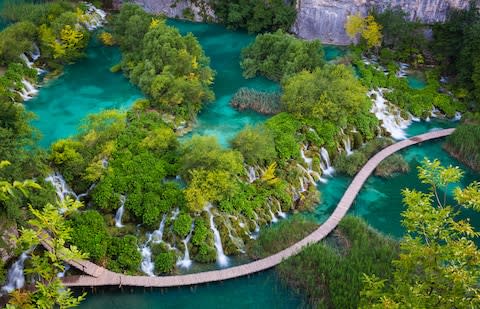
30. Greyfriar's Bobby is a very good boy
The most famous dog in Scotland, nay, the world? See here to find out why.
31. Hiking up the Pitons is tougher than expected
But absolutely worth it, found Oliver Smith on a visit to St Lucia.
32. Sudan is wonderful – and has more pyramids than Egypt
So Chris Leadbeater discovered on a visit in March: “I am agog at the pyramid of King Aspelta, a structure of symmetrical perfection, and there are amused observations on the number of photographs I am taking. It dawns on me that, for this Sudanese man, the note of fascination is not the ancient joys he has ambled past every day since childhood – but that anyone would come to see them.”

33. There is a new tool for dodging queues at Europe's most popular attractions
Google's Popular Times chart shows people when some of the continent's great cultural centres are at their busiest. Using results generated by data collected from visitors’ phone signals, the chart indicates – hour by hour and for each day of the week – how busy the sight is likely to be. It displays the typical length of time spent at the sight and, during opening hours, shows live information on whether it is unusually quiet or busy at that moment.
34. There's more to Munich than beer, bratwurst and football
“People forget – or never learned – that this city was the home of the dukes of Bavaria. It has a very different tale – one that is full of wonderful art and architecture,” a British art historian living in Munich told Chris Leadbeater in September. “Munich is not like other German cities,” he explains. “It doesn’t peer north, or east. It looks south, over the Alps, to Italy, for its ambience and inspiration. It always has, really.”
Where you should fly in 2018: The 12 most exciting new routes
35. Your subconscious can reveal where you really want to go on holiday
In October, Tui, Britain's biggest tour operator, launched a prototype of a new type of digital travel agent. Called Destination U, it uses “emotionally intelligent” technology to measure your responses. It will, according to Tui, “unlock your holiday desires”, tapping into your subconscious to reveal where you really want to go on holiday. Nick Trend thought he wanted to go skiing... he was wrong.
36. Sharm is still off the map
In July the Foreign Office (FCO) lifted restrictions on travel to Tunisia, two years after the deadly Sousse beach attack. The move was welcomed by the nation’s tourism industry as well as British holidaymakers and tour operators fond of visiting the popular winter sun haunt. To the east, Egypt did not feel so blessed. The FCO ban on flying to its Red Sea beach resort, Sharm el-Sheikh, remained in place despite protestations from British MPs and the Egyptian ambassador. As travellers begin to return to Tunisia, Sharm will be hoping its turn comes in 2018.
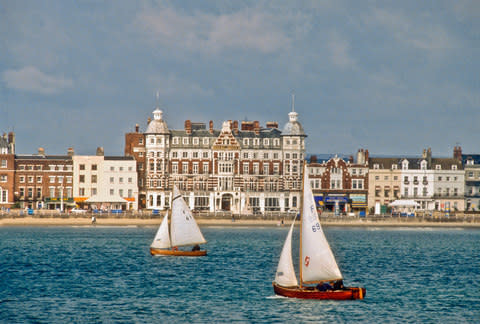
37. Britain’s beaches are getting cleaner
As Keep Britain Tidy marked 30 years of awarding Blue Flags to beaches that deserve recognition for the cleanliness of their sands and waters, England’s coastline enjoyed 68 accolades, nearly six times as many were handed out in 1987. Five beaches on the inaugural list remain there today, including Oddicombe, Swanage and Weymouth. As in previous years, Cornwall shone as the county with the cleanest beaches, claiming seven Blue Flags.
38. Cities should act now to prevent future overcrowding
Dubrovnik, Barcelona and Venice have become synonymous with overcrowding. And they are taking action. Dubrovnik, the tiny medieval stronghold perched on the Adriatic, is preparing to cut drastically the number of visitors allowed inside its old walls at any given time, while Venice is mulling over myriad ways to deal with its daily droves of cruise passengers. The World Travel and Tourism Council has warned other cities that prevention is much more effective than cure.
Top 20 | Most read Telegraph Travel stories of 2017
39. Trump’s presidency is hurting US tourism
The demand for flights to nearly every major US city fell this year, according to recent research from Kayak, the flight search website. It adds to the weight of evidence that the incumbent US president is doing little to increase his country’s appeal among holidaymakers – the fall in visitors has even been labelled the “Trump slump”.
Official figures show that this year, while international travel has been growing around the world, America’s total overseas arrivals have fallen by 5.3 per cent year-on-year, while arrivals from the UK are down 6.3 per cent. This decline might not sound vast, but it is significant, costing the US economy up to £140m a week, according to the Global Business Travel Association.
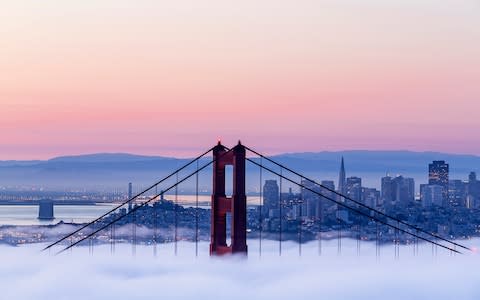
40. Brigitte Bardot would not like St Tropez today
St Tropez’s beachfront may look a little different after next summer as a new law covering the French resort forces the closure of a number of the bohemian restaurant shacks from the white sand of Pampelonne, made famous Brigitte Bardot in the 1956 film And God Created Woman. The chic driftwood structures will be removed in favour of collapsible flat-pack outlets that can be taken down if required. Four of the 27 will close completely, while the number of mattresses available to the well-heeled for lounging will be reduced by nearly half from 5,000 to 3,000. “We risk erasing a large part of the history of St Tropez,” said Josselin Chouvet, who runs Tabou, a beach bar established in the Fifties.
41. You should take your five-year-old on holiday
The received parenting wisdom that it is not worth taking young children on expensive overseas holidays is nonsense, according to science.